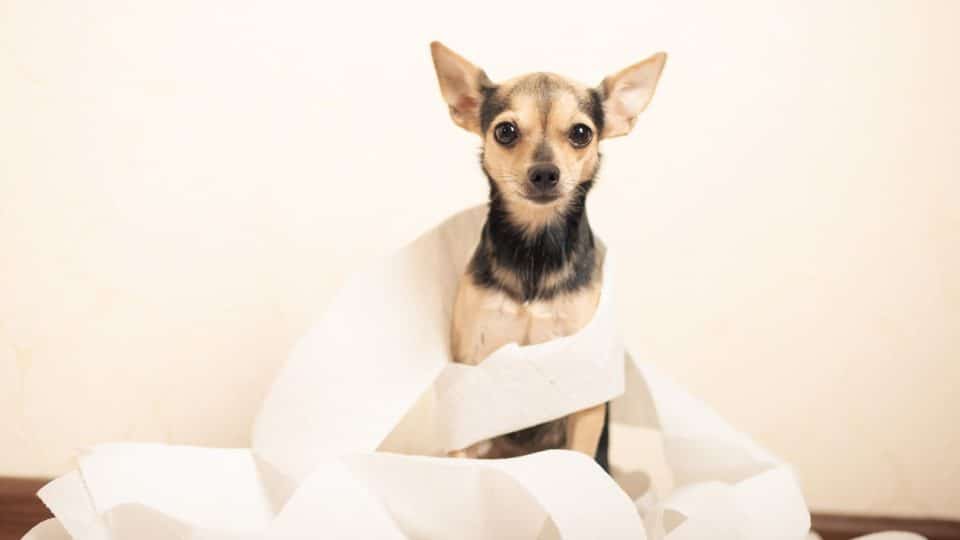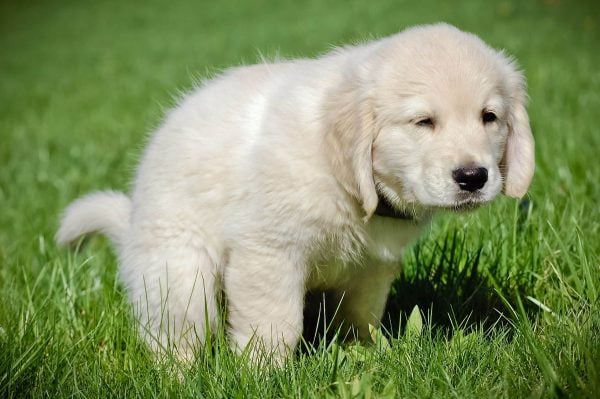- Not a substitute for professional veterinary help.
Diarrhea is a very common issue for puppies. In most cases, it clears up in a few days and you can treat it at home without a visit to the vet.
“Puppy diarrhea is particularly common in the first few months of life, when puppies are building up their immune system and getting used to new lives, foods, and environments,” says Dr. Aimee Warner, resident veterinarian at Waggel.
Ongoing diarrhea can be a sign of an underlying condition, Dr. Warner says.
If your puppy’s diarrhea doesn’t get better in a few days or clears up and keeps coming back, it’s important to contact your vet. Puppies are more prone to dehydration and nutritional loss, so chronic diarrhea can have serious consequences.
Dealing with puppy diarrhea is never fun, but we’ve got all the information you need to handle it, from common types to the best ways to treat and prevent it.
Types of Puppy Diarrhea
Understanding what type of diarrhea your puppy has can help you decide if you can monitor them at home or need to make a trip to the vet. If you’re unsure, it’s always best to contact your vet for more guidance.
Soft stool
Soft stool is often a sign that something has irritated your puppy’s digestive system. Possible irritants include new foods, parasites, and mild stress.
What to do: Monitor for 24-48 hours. If soft stool continues for more than two days or happens with symptoms like fever or lethargy, contact your vet.
Liquid stool
Possible causes of runny, watery diarrhea include bacterial or viral infections, parasites, or medication reactions.
What to do: Puppies with liquid stool can become dehydrated very quickly, so it’s always best to call your vet for advice.
Diarrhea with blood
Diarrhea with blood can be very scary.
Sometimes this happens due to inflammation in the colon, but bloody diarrhea can have other causes, too. For example, your puppy may have eaten something they shouldn’t have. They could also have intestinal parasites or an infection like parvovirus or E. coli.
What to do: If you notice a small amount of bright red blood, pay close attention to your puppy’s stools and contact your vet if it happens again. If you see a lot of bright red blood or black diarrhea, contact your vet right away.
Diarrhea with mucus
Mucus in diarrhea may look like slime or jelly. This type of diarrhea usually happens because of stress, sudden dietary changes, parasites, or an infection.
What to do: A small amount of mucus in diarrhea is usually nothing to worry about. Pay attention to your puppy’s stools for 24-48 hours. If you notice a lot of mucus or other symptoms like vomiting or blood in the stool, contact your vet.
Yellow diarrhea
Yellow poop typically happens due to digestive problems or dietary intolerance. Sometimes, it can happen with liver and pancreatic issues, but these health concerns aren’t common in puppies.
What to do: Monitor your puppy for a day or two. If their poop doesn’t return to its usual color, contact your vet for more guidance.
When To Contact a Vet
Puppy diarrhea that happens alongside other unusual symptoms can sometimes be a medical emergency.
Contact your vet right away if your puppy has any type of diarrhea and any of the following:
- Vomiting
- Lethargy
- Appetite loss
- Not drinking water
- Weakness or collapse
- Tremors
- Signs of pain
- Fever
- Cold ears or paws
- Coughing or sneezing
- Nasal discharge
Treating Puppy Diarrhea by Cause
If your puppy’s diarrhea doesn’t clear up within two days or happens with symptoms like vomiting or fever, you’ll want to contact your vet. They can do tests to find the underlying cause, which can help them prescribe the most effective treatment.
If possible, collect a sample of your puppy’s stool so you can bring it to your appointment. A fresh sample is best—you can keep it in the fridge for a few hours if you’re not going to the vet right away. Just double-bag it to make sure the sample doesn’t contaminate your refrigerator or food.
Here are some of the most common causes and what your vet might do to treat them:
- Bacterial infection: Your vet will prescribe antibiotics and fluids to prevent dehydration. They may also recommend probiotics to restore gut balance.
- Viral infection: Parvovirus and distemper often need intensive care, including IV fluids, at your vet clinic.
- Intestinal parasites: After a positive fecal test, your vet will prescribe medication.
- Dietary or digestive problems: Your vet will usually recommend switching to a bland diet of chicken and rice before slowly transitioning to a new food over 7-10 days.
- Gastrointestinal blockage: Your vet may palpate your puppy’s abdomen and order x-rays to confirm a blockage. If they don’t think the blockage will pass on its own, they will recommend removing it with surgery.
Treating Puppy Diarrhea at Home
If your puppy has diarrhea, try not to panic.
Keep in mind that puppies often get diarrhea after vaccinations, deworming, when stressed or anxious, or when switching to a new food too quickly.
As you clean up, check to make sure the diarrhea doesn’t contain any blood or mucus. Make sure to disinfect the area, too!
If your puppy is otherwise healthy—still playing, eating, and drinking—you can try a temporary bland diet of white rice and boiled chicken, Dr. Warner says.
Keep your puppy quiet, with minimal exercise, since overexertion can also cause diarrhea.
A few other tips from Dr. Patrick Mahaney, veterinarian, certified veterinary acupuncturist, and certified veterinary journalist:
- Help your puppy stay hydrated by providing plenty of fresh water at all times. You can also try offering ice cubes for them to lick.
- Offer probiotics to replenish their gut health. Probiotics come in various forms, such as powders, capsules, chews, and yogurt or kefir. Just ask your vet first!
- Incorporate prebiotic foods to nourish and promote the growth of good bacteria living in the colon.
Dr. Warner recommends contacting your vet for diarrhea that lasts longer than a day or gets worse. “If your puppy is vomiting or lethargic or has a fever, bloody diarrhea, or very watery stools, call your veterinarian immediately,” she adds.
How To Prevent Puppy Diarrhea
You can’t prevent every case of puppy diarrhea and other stomach troubles, but these strategies can help keep your puppy’s digestion healthy—and regular:
- Introduce new foods gradually: Sudden dietary changes can trigger diarrhea, so make any changes in their food slowly, over 7-10 days.
- Avoid dairy products: Many dogs are lactose intolerant, so dairy products can trigger diarrhea. Stick to treats meant for growing puppies!
- Limit fatty treats and table scraps: Rich foods like liver or table scraps can overwhelm a puppy’s developing digestive system.
- Puppy-proof your home: It’s important to puppy-proof your home to keep your puppy from getting into trash, cleaning products, human food, or small objects they might accidentally swallow.
- Follow a vaccination schedule: Vaccines protect your puppy from illnesses like parvo, which can cause serious diarrhea and death.
- Avoid leaving your puppy alone for long periods: Leaving your puppy home alone for too long may trigger stress diarrhea.
- Check how often your puppy poops: Tracking how often your puppy poops can help you monitor their stomach health, since you’ll notice quickly if something changes or their poop looks different than usual.
- Pick up your puppy’s poop: Puppies sometimes eat poop—their own as well as other dogs’ poop— so clean up after them as soon as possible.
- Teach your puppy “Drop it”: If you see your puppy starting to eat something they shouldn’t, the “Drop” command helps keep them from eating any more.
Tip: If you need to go away, boarding your puppy with a pet sitter can help reduce stress, keep them safe, and make sure they get all the TLC they deserve. Check out Rover’s dog boarding services to find an experienced pet sitter in your area.




